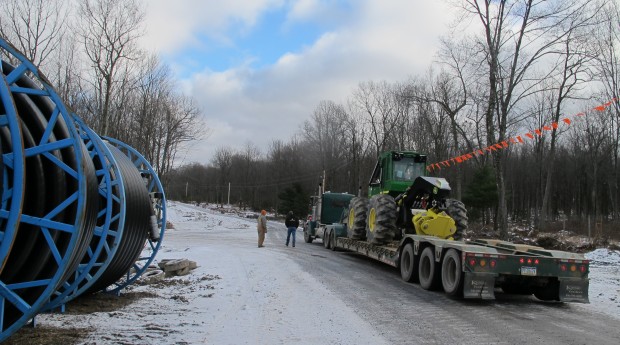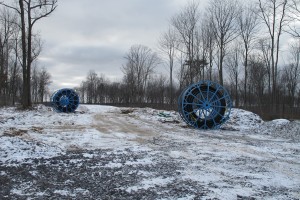What happened to DCNR’s $6 million Marcellus monitoring report?
-
Marie Cusick

Marie Cusick/ StateImpact Pennsylvania
A truck moves heavy equipment through the Tiadaghton State Forest in Lycoming County.
After spending more than three years and $6 million to monitor how gas drilling is affecting public forests, the state Department of Conservation and Natural Resources has yet to release the information, and environmental groups are beginning to raise questions.
In late 2010, the Rendell administration launched the program— touting it as one of the most aggressive monitoring initiatives by a public agency in the nation.
More than three years later, under the Corbett administration, DCNR has so far refused to share its findings with the public.
“Long overdue”
“The Marcellus monitoring report, it’s way long overdue,” says Dick Martin of the Pennsylvania Forest Coalition. “We need that data as a baseline in order to find out the effects.”
About a third of Pennsylvania’s 2.2 million acres of state forest land is available for oil and gas drilling.
John Quigley headed DCNR under Rendell, a Democrat. He helped launch the department’s Marcellus monitoring program. He managed to secure 18 new positions and a $2 million-a-year budget.

Marie Cusick/ StateImpact Pennsylvania
Large spools of tubing sit in an area cleared of trees in the Tiadaghton State Forest.
“The focus was to annually generate data that DCNR could analyze, but [also] the academic community and the peer-review process,” says Quigley. “So that we could collaboratively develop a full understanding of the impacts.”
Quigely may have hoped for annual reports, but he left DCNR with the change in administrations, shortly after developing the program.
“We’d like to minimize the disturbance”
Under Governor Corbett, the agency says it has taken time to staff up the monitoring program and develop protocols. Dan Devlin heads DCNR’s Bureau of Forestry.
“Anytime you do something for the first time, it takes a little bit of time to pull it all together,” he says, “That’s what we’re trying to do.”
Devlin says the monitoring report will document the many ways drilling is affecting forests.
“Whether it’s noise, eliminating trees, new road construction– whatever. From our perspective, we’d like to minimize the disturbance to the greatest extent possible.” he says.
Jeff Schmidt is the retired director of the Pennsylvania chapter of the Sierra Club. He now chairs the group’s public lands committee and has been following DCNR’s progress.
“We’re curious why the report has not been issued yet,” he says. “We are concerned there may be efforts by the governor’s office or other political sources to sanitize it.”
Jim Grace is a Penn State Professor of Forestry who chairs DCNR’s natural gas advisory committee. He doubts there was any attempt to slow-walk or suppress the monitoring process.
“I think being that it’s the first one, it’s occurring a little slower than some hope,” Grace says. “But hopefully it’s well underway and we’ll have it soon.”
In the meantime, Dick Martin says DCNR recently met with environmental groups to discuss the program, but they’re still trying to get the agency to offer up more details.
“Transparency from the agency would be enhanced if they would release some of the data and information we have requested,” says Martin.
The department recently denied a Right to Know Law request by StateImpact Pennsylvania seeking more information about the monitoring program.
A DCNR spokeswoman says the initial report will be published within a few months, with subsequent reports coming out every two years.
















